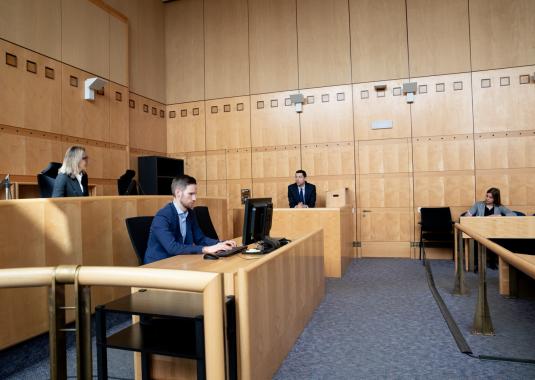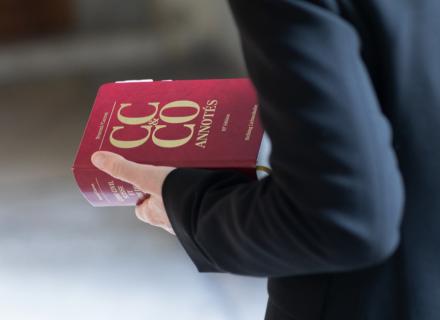Contacts
Address
Contact details
Mailing address
Tribunal des prud'hommes
Case postale 3688
1211 Genève 3
Presidency and directorate
-

Mme Sylvianne ZEDER-AUBERT
Présidente
-

Mrs. Emmanuelle PASQUIER
Director
Competences
The Tribunal des prud'hommes may be seized by employees or employers in particular in the context of disputes on the following subjects:
- Application of the provisions relating to the individual employment contract within the meaning of article 319 and following articles of the Code of Obligations
- Interpretation, application or enforcement of collective employment contracts
- Application of the Federal Act on Gender Equality in employment relationships (GEA - RS 151.1)
It is competent to deal with disputes arising before, during and following the contractual employment relationship.
- Prior to the signature of the employment contract
In the context of disputes relating to the recruitment process (for example, in cases of employment discrimination).
- During the employment relationship
Regarding disputes arising during the contractual period (e.g. unpaid wages, issuance of a work certificate, sexual or psychological harassment).
- At the end of the employment contract
In case of disputes regarding the termination of the employment contract (e.g. wrongful termination or unjustified immediate termination of the contract).
Organization
The Tribunal des prud'hommes is composed of several actors who work closely together to deal with disputes. It is made up of conciliating judges, 190 judges, including 28 presidents, as well as legal and administrative staff.
The judges are called "lay judges". In other words, they are not career magistrates. They carry out their main activity as employers or employees in various professional fields and are divided into 4 groups according to their field of activity:
- Building, industry, crafts, building materials, agriculture, janitorial and cleaning services, mechanics, garages, body shops
- Hostelry, cafes and restaurants, industry, crafts and food trade
- Tourism, transport, non-food trade
- Administration and service companies, banks, insurance companies
- Medical and paramedical professions, legal and judicial professions, artistic professions, the domestic economy and various professions, not included in the other groups
The Tribunal des prud'hommes Office is the sole contact for litigants. It coordinates the administrative follow-up of the files and deals with questions related to the ongoing proceedings as well as the steps to be taken.
It does not answer legal questions.
Proceeding
Your steps in brief
Are you facing a conflict in your employment relationship? You can bring the case before the court.
Here is an overview of the proceedings at the Tribunal des prud'hommes, which consists of two levels: the conciliation authority and the court.
Step 1: bring an action before the court
Your claim must be filed with the Tribunal des prud'hommes’ Office or the Greffe universel. It can also be sent to the court by post or email only if you have a qualified electronic signature within the meaning of the Electronic Signature Act of 18 March 2016.
Your application should necessarily consist of the following elements:
- Precise and complete designation of the parties: first and last names or corporate name, valid address, etc.
- Value in dispute: Total amount you request.
- Matter in dispute: when the value in dispute does not exceed Fr. 30'000.-, you can use the simplified application form. If it exceeds Fr. 30'000.-, your request must contain a complete statement of facts with an indication of the evidence.
- Relevant documents: employment contract, termination letter, salary slips, etc.
Step 2: the conciliation
Any proceeding begins, except as provided by law, with an attempt at conciliation.
If no agreement is reached, you will receive authorization to proceed which allows you to bring the case before the court within 3 months.
In some cases, the conciliating judge may also render a decision at your request or make a proposal of judgment to which either party may object within 20 days.
Step 3: conduct of the proceeding by the court
The proceeding in the court involves 4 steps: preparatory measures to complete the case file, hearing of the parties and any possible witnesses, confirmation of everybody's position and finally the deliberations.
Step 4: service of the judgment
At the end of the proceeding, the court renders its judgment, which is sent to you by registered mail.
Application forms
Below you will find the forms and instructions necessary to file a request for conciliation, as well as the simplified procedure application form to use when you have received authorization to proceed and when the value in dispute of your request does not exceed Fr. 30'000.-.
Forms and documents must be filed in as many copies as there are parties.
For example, if you are suing only one defendant, you must file 2 copies; against 2 defendants, 3 copies, etc.
- Requête de conciliation au Tribunal des prud'hommes
- Requête de conciliation au Tribunal des prud'hommes (espagnol)
- Requête de conciliation au Tribunal des prud'hommes (anglais)
- Requête de conciliation au Tribunal des prud'hommes (portugais)
- Demande en procédure simplifiée
- Demande en procédure simplifiée (espagnol)
- Demande en procédure simplifiée (anglais)
- Demande en procédure simplifiée (portugais)
- Retrait d’une procédure au tribunal
- Retrait d’une procédure au tribunal (espagnol)
- Retrait d’une procédure au tribunal (anglais)
- Retrait d’une procédure au tribunal (portugais)
- Retrait d’une procédure en conciliation
- Retrait d’une procédure en conciliation (espagnol)
- Retrait d’une procédure en conciliation (anglais)
- Retrait d’une procédure en conciliation (portugais)
Inspection of case documents
Questions/answers
Hearings
Yes, the hearings are public unless the court orders that the hearing be closed due to an overriding private or public interest. However, hearings in conciliation proceedings are never public.
As a general rule, the parties can be represented by their lawyer. However, they are required to appear in person in 2 cases: when the court has expressly ordered it and during conciliation hearings.
At conciliation hearings, however, the parties may be represented if they live outside the canton or if they are unable to appear due to illness, age or other good reason.
Please note: the presence of the parties’ minor children (even babies) who have not been summoned to the hearing, is not allowed.
Labour law dispute
The Tribunal des prud'hommes intervenes only in private law disputes.
Disputes between the regular staff of the public administration and the latter are not judged by the Tribunal des prud'hommes, but by the Chambre administrative de la Cour de justice.
The Tribunal des prud'hommes is not competent to deal with disputes relating to cantonal or federal social insurance either. These disputes are generally dealt with by the Chambre des assurances sociales de la Cour de justice.
You can find all the information about the proceeding in the thematic guide Labour law dispute.
To terminate a conciliation proceeding, fill in the form Withdrawal of a conciliation proceeding.
To terminate the proceeding in court, fill in the form Withdrawal of an application to court.
Decisions of both the conciliation authority and the court may be challenged in the manner indicated to you.
This is not mandatory but recommended, especially if your case is complex.
Before the conciliation authority, proceedings are free of charge regardless of the value in dispute.
In court, if the value in dispute exceeds Fr. 75'000.-, an advance payment on costs will then be requested according to art. 69 of the rules of order setting out the tariff of registries in civil matters (RTFMC - E 1 05.10), with the exception of GEA cases which are free of charge.
Value in dispute from Fr. 75'001.- to 100'000.- / Cost from Fr. 200.- to 2'000.-
Value in dispute from Fr. 100'001.- to 300'000.- / Cost from Fr. 1'000.- to 3'000.-
Value in dispute from Fr. 300'001.- to 1'000'000.- / Cost from Fr. 2'000.- to 8'000.-
Value in dispute from Fr. 1'000'001.- / Cost from Fr. 10'000.-
Yes, to consult the file related to a proceeding, please fill in the form Inspection of case documents.
To obtain a copy of a judgment, fill in the form Request for documents (certificate, attestation, copy, record).
Tribunal des prud'hommes judge
The Tribunal des prud'hommes judges are not career magistrates: they exercise this function in addition to their main professional activity; they are lay judges or laymen.
They settle labour law disputes, the underlying principle being that these proceedings are judged by magistrates working in a field close to that of the parties.
The Tribunal des prud'hommes is composed of different professional groups, from which the judges are elected:
- Group 1: industry, watch industry, construction
- Group 2: hotels, restaurants and alimentary trade
- Group 3: non-alimentary trade, trade, personal care, tourism and transport
- Group 4: banking, insurance, security
- Group 5: medical and legal professions, information technology, private education, journalism, domestic work and other professions not included in the other groups
This means, for example, that if you work in hairdressing or esthetics, you will be assigned to group 3 and will deal with cases in this field.
The Tribunal des prud'hommes is organized on a parity basis: it is composed of a president and 2 judges, one representing the employer and the other the employee.
You will assist the president with your professional experience and knowledge during the hearings, along with another judge.
Before the hearing, the president explains the case.
During the hearing itself, you participate in the investigation of the case by hearing the parties and witnesses.
At the end of the investigation phase, during the deliberation, you give your opinion and discuss the case and then decide, in agreement with the other members of the panel, whether or not the request is well-founded and what amounts should be granted.
The hearings take place in the evening. They start between 17h30 and 18h30 in one of the Judiciary Power's premises. The average length of a hearing is about 2 hours. However, some are shorter, others much longer.
The president has the authority over the hearing. She/he directs the debates. However, you will be requested and invited to ask questions.
Tribunal des prud'hommes judges are assigned to specific occupational groups, based on their experience or main professional activity (see the Tribunal des prud'hommes page).
You will therefore be assigned to the professional group that corresponds to your activity and will receive cases within your area of expertise.
You will sit on average between one and two evenings per month; the hearings are scheduled several weeks in advance and your availability will be taken into account.
The function of labour judge constitutes an activity that is secondary to your professional activity.
No, it is the knowledge of your profession and your professional experience that are required.
However, during the legislature, the Judiciary Power and the social partners organize a training course for you on labour law, civil proceedings and judicial organization; you can attend it in full or in part.
The courses take place in the evening or at lunchtime and are free of charge.
Although this training is not mandatory, it is highly recommended.
Yes, an indemnity is provided for in article 4 of the Rule relating to the indemnities allocated to various magistrates of the Judiciary Power, to the members of the Tribunal arbitral and to the members of the Conseil supérieur de la magistrature (RIPJ - E 2 40.03).
For the hearings:
- For the first hour: Fr. 190.-
- For each full additional hour: Fr. 30.-
It is recommended that you discuss this with your employer beforehand.
Tribunal des prud'hommes judges are elected by the cantonal Parliament every 6 years. The candidates for this function are presented to the cantonal Parliament by the social partners, i.e. the Union of Geneva Employers' Associations (UAPG) for the Tribunal des prud'hommes judges representing the employer side and the Geneva Community of Trade Union Action (CGAS) for the Tribunal des prud'hommes judges representing the employee side.
You must therefore contact either the UAPG or the CGAS if you wish to become a Tribunal des prud'hommes judge.
The conditions are set out in article 121 of the law on the exercise of political rights (LEDP - A 5 05).
In particular, you must be at least 18 years old and be able to provide a certificate of good conduct and an attestation that no certificate of shortfall is pending.
It is not necessary to be domiciled in the canton of Geneva.
If you are a Swiss citizen, you must have worked for at least one year in the canton of Geneva.
If you are unemployed, you are eligible but must have last worked in the canton of Geneva for at least one year.
If you are of foreign nationality, you must have worked in Switzerland for 8 years, the last year of which must have been spent in the canton of Geneva.
The age limit for serving as a labour Court judge is 72 years old.
If you meet the conditions of article 121 LEDP, you are eligible for the position of Tribunal des prud'hommes judge.
You can express your interest to the social partners at any time.
The next elections for Tribunal des prud'hommes judges will take place in autumn 2029, with a view to taking office in January 2030.
The beginning of the application process and the selection of the candidates takes place in principle 6 months before the election date.
Useful links
- Code de procédure civile (CPC - RS 272)
- Code des obligations (CO - RS 220)
- Loi fédérale sur l’égalité entre femmes et hommes (LEg - RS 151.1)
- Loi sur le Tribunal des prud’hommes (LTPH - E 3 10)
- Elections des juges prud'hommes au Tribunal des prud'hommes
- Elections des juges conciliatrices-assesseures et conciliateurs-assesseurs du Tribunal des prud'hommes
- CGAS - Communauté genevoise d'action syndicale
- CSP - Centre social protestant
- FER - Fédération des Entreprises romandes Genève
- FGeM - Fédération genevoise médiation
- ODAGE - Permanence de l'ordre des avocats
- SEC - Société suisse des employés de commerce
- SIT - Syndicat interprofessionnel de travailleuses et travailleurs
- SSP/VPOD Syndicat des services publics
- Syndicat Unia
- Syndicom, le syndicat des médias et de la communication
- UAPG -Union des Associations Patronales Genevoises







